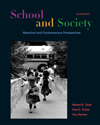 |  School and Society: Historical and Contemporary Perspectives, 4/e Stephen E. Tozer,
The University of Illinois, Chicago
Paul C. Violas
Guy Senese,
Northern Arizona University
Introduction: Understanding School and Society
Learning ObjectivesAmong the objectives that Chapter 1 seeks to achieve are these:
| Students should become acquainted with the basic conceptual tools used throughout the book, especially political economy, ideology, and schooling. They should begin to understand how each of these influences the other, though that influence will not be of equal proportion. |
 |  |  | | By entertaining the view that good theorizing explains practical phenomena and therefore can guide practice, students should begin to question the idea that "theory" and "practice" are opposed to each other, or the idea that if something is theoretical, it probably is not practical. |
 |  |  | | Students should consider basic distinctions among schooling, training, and education so they can begin to reflect on the concept of education as a value-laden ideal, one that allows them to evaluate schooling and training practices for their educational worth. |
 |  |  | | Students are intended to consider the feudal European and classical Athenian periods as occasions for interpreting relationships among political economy, ideology, and schooling practices. They should notice in particular how these basic tools of inquiry operate in historical cultural contexts different from our own. |
 |  |  | | Students are to begin considering the meanings and limitations of the concept of democracy in cultural context. They might, for example, notice the egalitarian impulses of an Athenian society that selected its legislators by lottery, while reflecting critically on how a "democratic" culture can exclude most of its residents from political participation. |
 |  |  | | Students should be able to provide examples that illustrate why it is important to understand the social contexts of schooling if we are to understand what takes place in schooling. |
|



 2002 McGraw-Hill Higher Education
2002 McGraw-Hill Higher Education